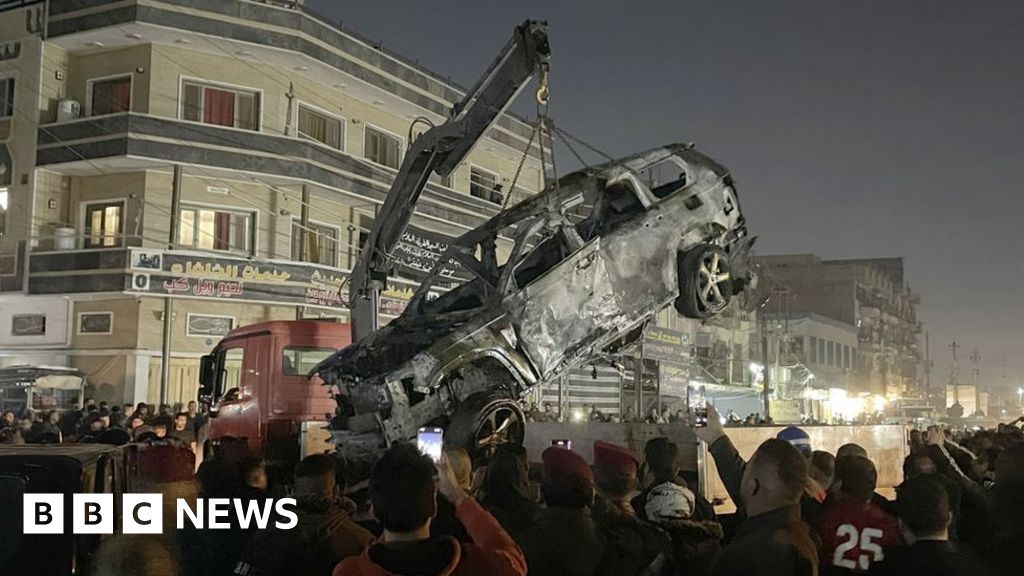
- Written by Orla Guerin and Hugo Pachega
- BBC News, Baghdad
Watch: BBC correspondent Orla Guerin at the site of the US drone strike in Baghdad
A senior Iranian-backed militia commander was killed in a US drone strike in Baghdad.
One of the leaders of the Hezbollah Brigades and two of his guards were in a car when it was targeted east of the Iraqi capital. All three of them died.
The Pentagon said the commander was responsible for directing attacks on US forces in the region.
The United States linked the militia to a drone attack in Jordan that killed three American soldiers last month.
Following this attack, Kataib Hezbollah said it had suspended its attacks on US forces to prevent “embarrassment” of the Iraqi government.
A drone strike occurred on Wednesday night in the Al-Mashtal neighborhood in Baghdad, causing several loud explosions.
It was a precise hit on a moving car on a busy street, reducing the vehicle to a flaming wreck.
One of the victims was identified as Abu Baqir al-Saadi, a senior commander in the Hezbollah Brigades.
Image source, Getty Images
The US Central Command (Centcom) said that the attack, which occurred at 21:30 local time (18:30 GMT), led to the killing of “the commander responsible for direct planning and participation in attacks on American forces in the region.”
“There are no indications of collateral damage or civilian casualties at this time,” the Central Command statement said.
When the BBC team arrived at the scene, crowds of demonstrators gathered chanting: “America is the Great Satan.”
There was a heavy police presence, and they were joined by SWAT teams from the Iraqi Ministry of Interior.
Image source, Getty Images
The BBC team tried to approach the burning car, but were turned away by onlookers, saying journalists were not welcome.
One of the men shouted, “You are foreigners,” adding, “And the foreigners are responsible for this.”
The raid comes days after the United States launched 85 raids on the Iraqi-Syrian border area in response to the deadly January 28 drone attack on American forces at a base in Jordan.
President Joe Biden described the wave of attacks that occurred last Friday as just the beginning of the American response.
The drone strike in the Iraqi capital would be seen as a major escalation.
But perhaps it was inevitable that the American strategy would include targeting not only the infrastructure used by these groups, but also their senior leaders.
Shortly after Wednesday's attack, militias in the country called for retaliation against the United States.
Harakat al-Nujaba, another group accused of launching attacks against US forces, issued a statement vowing “targeted revenge,” adding that “these crimes will not go unpunished,” according to Agence France-Presse.
On January 4, the United States launched an air strike in Baghdad that killed a senior leader of the Nujaba movement.
American forces have been subjected to more than 165 missile and drone strikes since the start of the Israeli war on Gaza on October 7.
The Pentagon says that the United States has about 2,500 soldiers in Iraq and 900 soldiers in neighboring Syria on a mission to fight the ISIS terrorist organization.
The US military also recently launched attacks against the Iran-aligned Houthi movement in Yemen, in response to attacks against commercial ships in the Red Sea.
Additional reporting by Sanjar Khalil and Max Matza

“Travel specialist. Typical social media scholar. Friend of animals everywhere. Freelance zombie ninja. Twitter buff.”





More Stories
Taiwan is preparing to face strong Typhoon Kung-ri
Israel orders residents of Baalbek, eastern Lebanon, to evacuate
Zelensky: North Korean forces are pushing the war with Russia “beyond the borders”